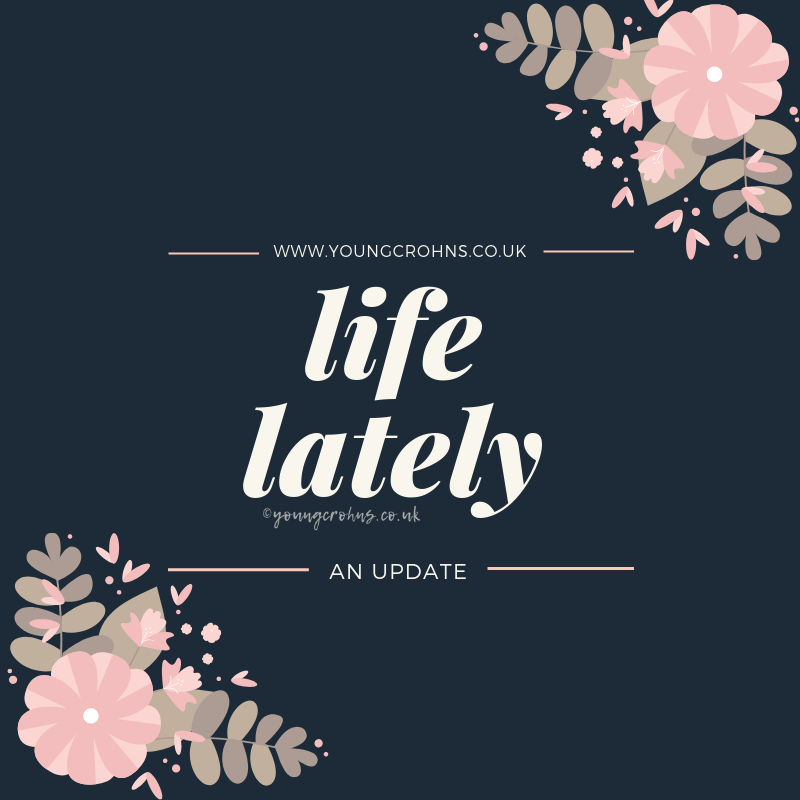
Life Lately | What Exactly is Going On?
I always get nervous … because I always wonder if I should or could go without my medication. It is not a matter of fighting for the funding like it has been before, but its more about how my body and disease will cope without medication. It is a catch 22 situation of whether I would be better off without it as it could be deemed unnecessary as I am in ‘clinical remission’ or would it be smarter to continue on what is clearly maintaining a level playing field for me?
Vedolizumab – Two Years On
It’s been a long while since I updated my site with ‘my own personal health issues’ because well, things have been good.
It’s been 18 months since I had any IBD medication. Even with a pandemic, a hernia repair surgery and having limited F2F contact with my medical team, I’ve actually been and felt well for all of that time. I mean, the hernia was a miserable thing to deal with – the pain and blockages were a next-level depth of IBD hell – but they were temporary. I’ve not felt any of the long term ‘IBD unwellness’ that I associate with my own particular brand of Crohn’s.
Until Christmas.
Something, one day, changed. I don’t know what it was, much less remember really the particular moment it happened – it shouldn’t matter too much really; there is no rhyme or reason to IBD flare-ups 99.9% of the time, it is part and parcel of having IBD – but remission was gone. NB: I use ‘remission’ here to mean ‘free of big, ugly symptoms’ not the daily grind of a chronic illness.
It took me a week or so to gather my sensibility and call my IBD team. The nurses triaged me over the phone – because, pandemic life, ya know? – and wanted blood and stool samples done. “Let’s get a sense of where we are. We already have your baseline – I did those back in the Autumn – so we can determine what’s happening.”
Off I trotted to the hospital to drop off a sample, give some blood and try my best to just chill out. Bloods came back the same day, high CRP, WBC and screwed up liver tests. The latter is ‘normal’ for me but still, worrisome. The stool came back a week later and it was high, showing active disease. I was ordered an SB MRI and told to sit tight.
After much chasing for the MRI appointment, I had one in early March – yep, things were moving slow – and this one was particularly troublesome. I had a collection of fluid around my midline incision, some of my bowel was tethered to my liver and they could see some inflammation. The cause of said inflammation was debated for a while – was it post-surgical? was it active disease? – by my GI consultant and surgeon, and they finally concluded I needed a scope through my stoma to really see what was going on.
So how was I feeling during this?
Well, I was having partial blockages (again), increased pain around my stoma and lower right side of my abdomen, as well as incredible nausea that would wake up from a dead sleep at 3 AM like clockwork. Plus my stoma was flushing like it was going out of fashion (it would be constant liquid output with undigested food in it, from the blockages). That alone was exhausted, add in low B12 fatigue and studying for exams… it was a hard slog, all around.
To me, this was sort of becoming a ‘normal’ thing. I’d had it happen in the past and just took it to be part of how things were for me since I lived with a permanent ileostomy. Sure, some of that can be true, but should it be how I ‘need’ to live? Nope, definitely not. I saw my consultant a few days later following the MRI, where we discussed my lengthy and complex history, as well as treatment plans.
All of the plans hinged on needed the scope to really uncover what was going on inside, plus that would also help us apply for funding for medication – it would come to that, he said, if there was active disease. He pointed out, that my blood work was swaying that way, so we would reconvene after my scope.
That scope has been delayed due to the NHS backlog on Endoscopy procedures. Fine, I am happy to wait, I can cope with this, I said to my team. I had a quick review with my IBD nurse in early April – when I still didn’t have an appointment date – and she encouraged me to not sit in silence if things got worse. They haven’t – fingers crossed for this to continue at the time of writing – but they are concerning. She ordered all the pre-biological medication blood work and organised a date for a chest X-ray. Ironically, the day of my scope!
Last week, the blood work was back – because of the volume of it and the specialist testing required, it takes two weeks to come back – and she preemptively booked in my loading doses for Vedolizumab.

Yes, for the fourth time, I am going to be restarting Vedolizumab later this month.
NB: this is all pending of course, it remains on hold until my scope confirms (or, I suppose, denies) active disease.
I have always had a good response to Vedolizumab. Each time it has been stopped, it hasn’t been because I have failed it – what an archaic turn of phrase – but because we withdrew it from my treatment plan.
- In 2016 this was because I chose surgery – my right hemicolectomy.
- In 2017 this was because I had ‘unlocked’ clinical remission and wanted to go without medication for as long as my body could. Spoiler: it would be four months!
- And finally, in 2019 it was down to another bout of clinical remission was established. Truly grateful, blessed and baffled I have gotten 18 months out of this stretch!
I’m unsure if my story here is familiar to any other patient? I am also unsure if this makes me a little odd to return, time and time again, to the same medication. It is probably something I should ask – I am damn curious, I can tell you that much – but how? And to whom? Would I get anything from it?
Until next time,

Do you have any questions or queries? Or just want to share your own experiences? You can leave me a reply here or leave comments via my social media accounts – on Twitter, find my blog page on Facebook and over on Instagram
If you enjoyed this post check out The Return of Everything and New Beginnings & IBD Remission.


